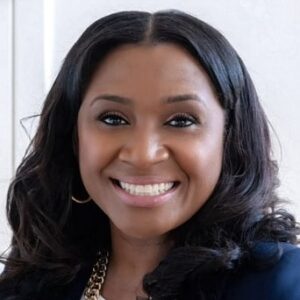 Tashni-Ann Dubroy, chief operating officer of Howard University, has been named chair of the board of directors for the National Association of College and University Business Officers. Her appointment makes her the first Black woman to serve in the role.
Tashni-Ann Dubroy, chief operating officer of Howard University, has been named chair of the board of directors for the National Association of College and University Business Officers. Her appointment makes her the first Black woman to serve in the role.
For the past seven years, Dr. Dubroy has served as executive vice president and chief operating officer at historically Black Howard University in Washington, D.C. In this role, she has focused on improving the university’s financial stability and infrastructure.
In 2015, Dr. Dubroy was named president of Shaw University, a historically Black institution in Raleigh, North Carolina. She served in the role for two years before leaving to pursue her current role at Howard. Earlier in her career at Shaw, she served as special assistant to the president for process optimization and chair of the department of natural sciences and mathematics.
Outside of higher education, Dr. Dubroy is the co-founder of Tea and Honey Blends, a hair care products company, and the Brilliant and Beautiful Foundation, which seeks to increase interest in the sciences among girls in middle school.
“I am immensely optimistic about the future of NACUBO,” said Dr. Dubroy. “We’ve never been stronger, and I look forward to working with my fellow board members to strengthen the value we provide to our member institutions, and in turn, to the students they serve.”
A native of Jamaica, Dr. Dubroy is a graduate of Shaw University, where she majored in chemistry. She holds an MBA from Rutgers University in New Jersey and a Ph.D. in physical organic chemistry from North Carolina State University.


Hey JBHE,
You should at least be honest regarding Dr. Dubroy. This lady is a damn Jamaican and not a native born Black American. In fact, Jamaicans in the USA self-identify as Jamaican and don’t align themselves with the collective native born Black American community. That said, the only time Jamaicans align themselves with native born Black Americans is when it’s fiscally beneficial to them. For those who dissent, I look forward to hearing your rebuttal.
The commenter above is correct in that Black Americans have discovered that rather than taking a Pan-African approach, many Black Immigrants only identify as Black when it benefits them, such as advancing their careers, attending an HBCU, or joining Black American built social, economic, and political organizations.
When the story is positive, however, they are often quick to point out their home country and de-emphasize Black race. When they need help, alternatively, they often then identify as Black, or if the story is negative their home country is shielded or de-emphazed, and Blackness highlighted. This behavior harmed Dr. Gay, who was quick to identify as primarily immigrant and ‘Haitian’ when she was elected Harvard President. With little connection to the Grassroots and broader Black community, she became ‘Black’ in the headlines, instead, when she was in trouble. Dr. Gay had previously harmed two highly prominent Black Harvard faculty members. She discovered very quickly how the dominant society categorizes her, with a divide-and-conquer strategy, despite her many accomplishments, when power is in play.
Many are also advanced ahead as less threatening to the racial caste system when they have white spouses as a template. In contrast, Dr. Nicole Hannah-Jones, with deep community and Grassroots connections, was able to weather the threat by the white power structure at UNC, and dictate her own tenure terms with strength. Dr. Jones has always identified as Black with no qualifiers, willing and able to beneficially challenge the status quo, not simply move up in it.
Not all Black immigrants allow themselves to be used in this way against Black Americans, ultimately harming themselves. Dr. Tony Martin, Ms. Shirley Chisholm, and many others stand in the pantheon of prioritizing Black interests. However, Black Americans are becoming more aware of this phenomenon to protect their interests, where being inclusive with Black immigrants who openly do not identify with Black Americans, like Emmanuel Ocho, has been harmful. Ocho, as a result, has recently been checked by Black Americans on non-constructive behavior. Ocho admitted such when confronted, and changed his behavior in that situation. It remains to be seen whether this holds, or whether further delineation is necessary. With success, there will be more agreement on collective constructive behavior.
Hey MK,
Your assessment is absolutely correct. Similar claims can be made towards the majority of African and Caribbean immigrants in the US. In fact, these African and Caribbean immigrants do not to the USA to establishment linkage with the native born Black American community. In most cases when you do see African and Caribbean immigrants within native born Black American spaces is to literally extract financial resources from the community.
Case in point, if one critically examines the HBCU administrative and faculty landscape one can easily a groundswell of African and Caribbean immigrants in key positions at these institutions. As a result, HBCUs become nothing more than sanctuary employment vessels for said persons. Of course, within the native born Black American soldiering in this great landscape we have always had a few outliers from those ranks who worked tirelessly in ‘Black America’s best interests. However, this cannot be said about the majority of people hailing from African and Caribbean countries.
Further, most are still harboring a colonial and survival mentality which hinders their ability to have any consistent and collective alliance with native born Black Americans. As a result, the native born Black American community must close ranks along with becoming very insular if it expects to survive in the future. I am saying this because every other racial/ethnic group aggressively practice this without any hesitation and it’s never questioned. When will the native born Black American community learn.